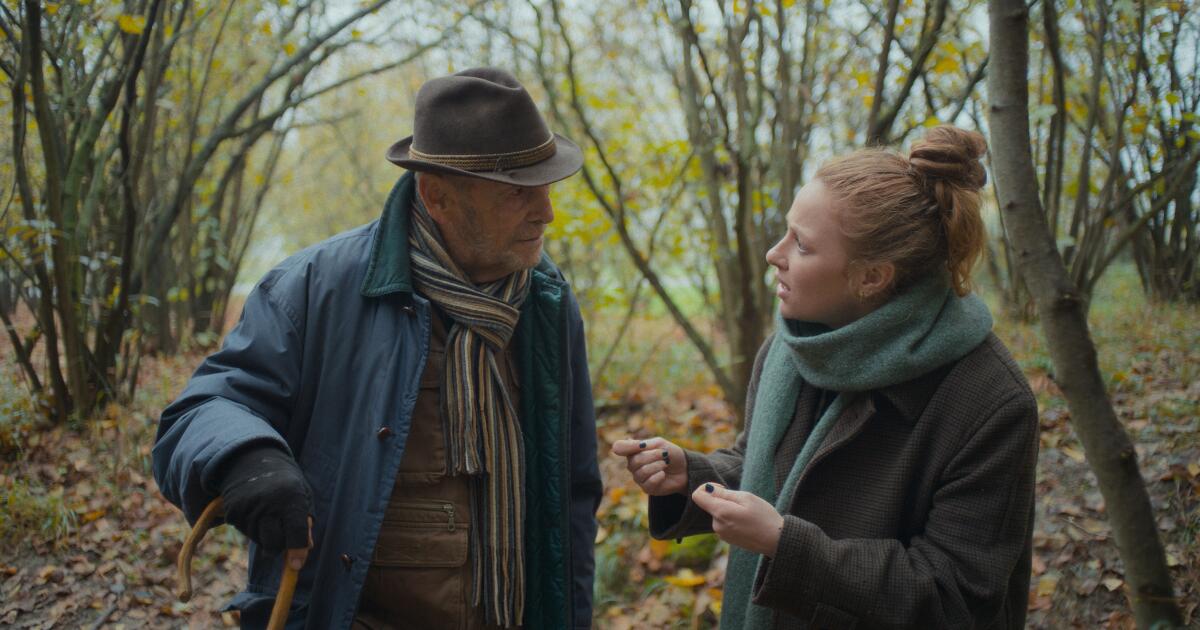To see Trifole is to fall in love with the Langhe, a stunning corner of the Piedmont region of northern Italy. Famous for its agriculture, cheeses and wineThis rolling countryside seems cut off from modernity: an agrarian past beautifully preserved in an uncertain present. One of Lange's hallmarks is its rich tradition of truffle harvesting, which becomes the centerpiece of director Gabriele Fabbro's tender drama about an aging truffle hunter, his restless granddaughter and a way of life disappearing before their eyes. Unfortunately, this heartfelt film resonates most strongly in these majestic landscapes rather than in the story that unfolds.
Constructed with the elemental purity of a fable, Trifole introduces the viewer to Dalia (Idalie Türk), in her mid-20s, visiting her grandfather Igor (Umberto Orsini). Dalia will be reluctant to make this trip. At the urging of her worried mother Martha (Margarita Bai), she takes a break from her stalled life in London to check on him, as Martha worries that his deteriorating memory may force him to leave his beloved dilapidated cottage and enter a nursing home. When Igor initially mistakes Dalia for his daughter—Dalia's mother—his confusion confirms Marta's concern.
Happy to live out the rest of his days in his remote paradise with his faithful dog Birba, who expertly assists him in his truffle hunts, Igor is unhappy that Dalia has abandoned her family roots for the big city. Indeed, Dalia has trouble with the Italian language, and when she offers to help him find truffles, he insists that his granddaughter doesn't have the instincts or the calloused hands needed for the job. But Igor doesn't just know how to sniff truffles – he quickly comes to the conclusion that she is emotionally lost. (The writing career did not work out the way she had hoped.) They are both at a crossroads and unsure of what the future holds.
Turk and Fabbro, who wrote the script, did extensive research into the region, incorporating the stories of local people into the narrative. No matter how fantastical Trifol ultimately becomes, the filmmakers insist that the plot is based on the stories they've collected. (There's actually Igor for this, Birba is a real truffle hunting dog, and there's a 2020 documentary, “Truffle Hunters” it correlates with much of what we see.) Unsurprisingly, this melancholy picture celebrates and mourns the Langhe, a region threatened by global warming and encroaching industrialization that threatens the once fruitful practice of truffle harvesting. Igor's fading memory turns out to be an apt, if obvious, metaphor for a profession gradually losing touch with its past as truffles become a hot gastronomic trend.
In its early parts, Trifol has an almost rudimentary narrative, establishing a familiar generational conflict between Dalia and Igor, who live under the same roof but cannot agree on a common opinion. When she tries to compliment his picturesque farmland, he curtly replies, “It’s nothing like the soil I knew when I was young.” Tensions only increase when Dahlia discovers that he is heavily in debt on his mortgage, as he does not have hundreds of thousands in debt. Igor's only hope is to find the elusive (and valuable) white truffle that could save him from foreclosure. But now he is too weak to boldly go into the dense forest. Dalia, under the leadership of Birba, must take on this quest.
The themes of the film are simply drawn out and easy to follow. Dalia may live in cosmopolitan London, but she is certainly unhappy, and wise old Igor immediately diagnoses the cause of her ailment. “You don’t love anything,” he wisely advises. “It will end up causing you a lot of pain.” Therefore, Dalia's journey in search of the mythical white truffle will also be an opportunity for Dalia to find a sense of purpose and a deeper appreciation for her grandfather. Terk presents his character as a collection of uncertainty and indecision, making Dahlia the perfect candidate for a metaphorical rebirth in an unlikely forest adventure in which magical events will occur.
In his second film, Fabbro, who previously directed the 2021 romantic thriller The Big Bolero, combines the quiet grace of Igor's humble life with the cacophony and commercialism of modern truffle auctions. But Fabbro's wistful salute to bygone traditions has significant limitations, most noticeable in the simplistic designs of his diametrically opposed protagonists. Now in his 90s, Orsini (best known Luchino ViscontiThe 1969 drama The Damned shows a fragile but enduring authority that is quite impressive, but Igor is reduced to a noble symbol – a simplification that also undermines Dahlia, who is little more than a stand-in for a younger generation ignorant of their country's history.
It is only when Fabbro points his camera at the Langhe sky, the land receding into the distance, that Trifol demonstrates the weight and grandeur of a culture in danger of extinction. You can almost touch the sacred soil of Igor’s youth, the world that only he remembers.
'Tripol'
In Italian and English, with subtitles
No rating
Opening hours: 1 hour 40 minutes
I play: Limited release Friday, November 14th.







